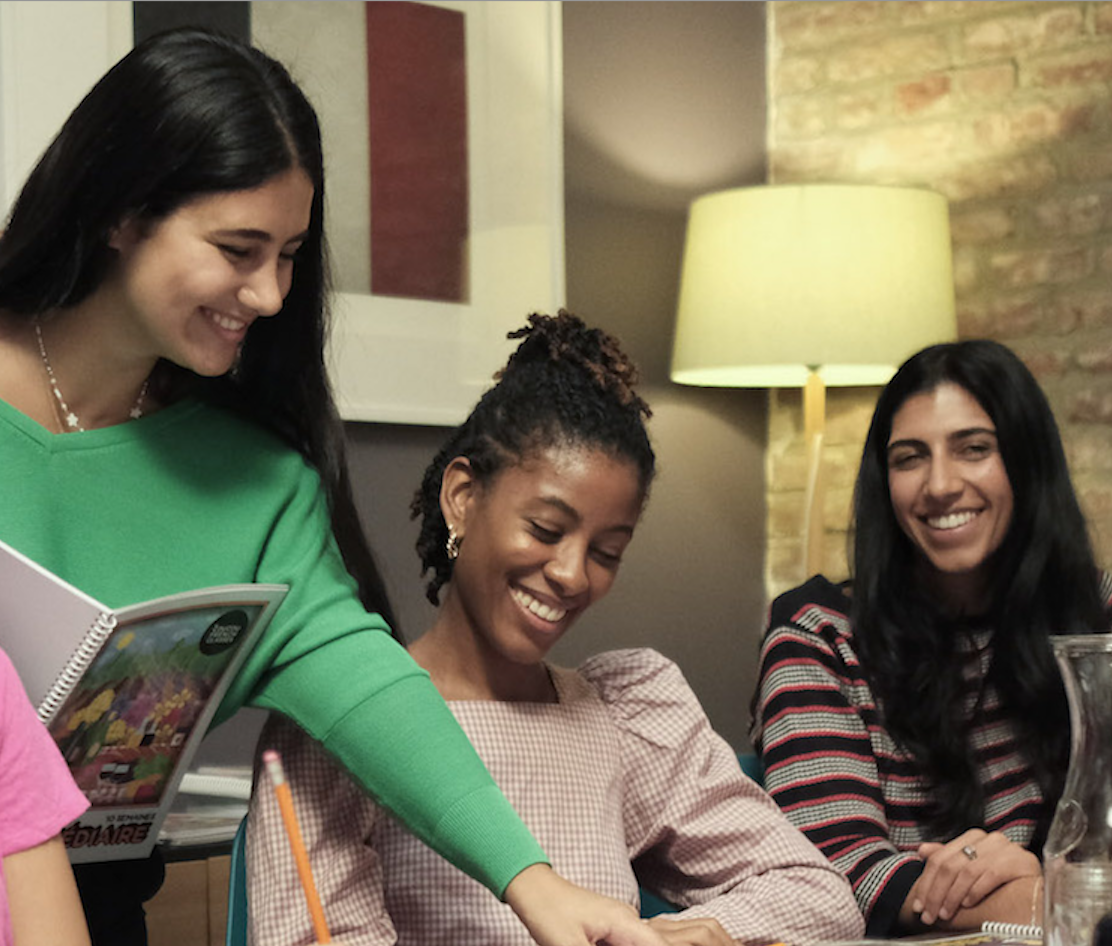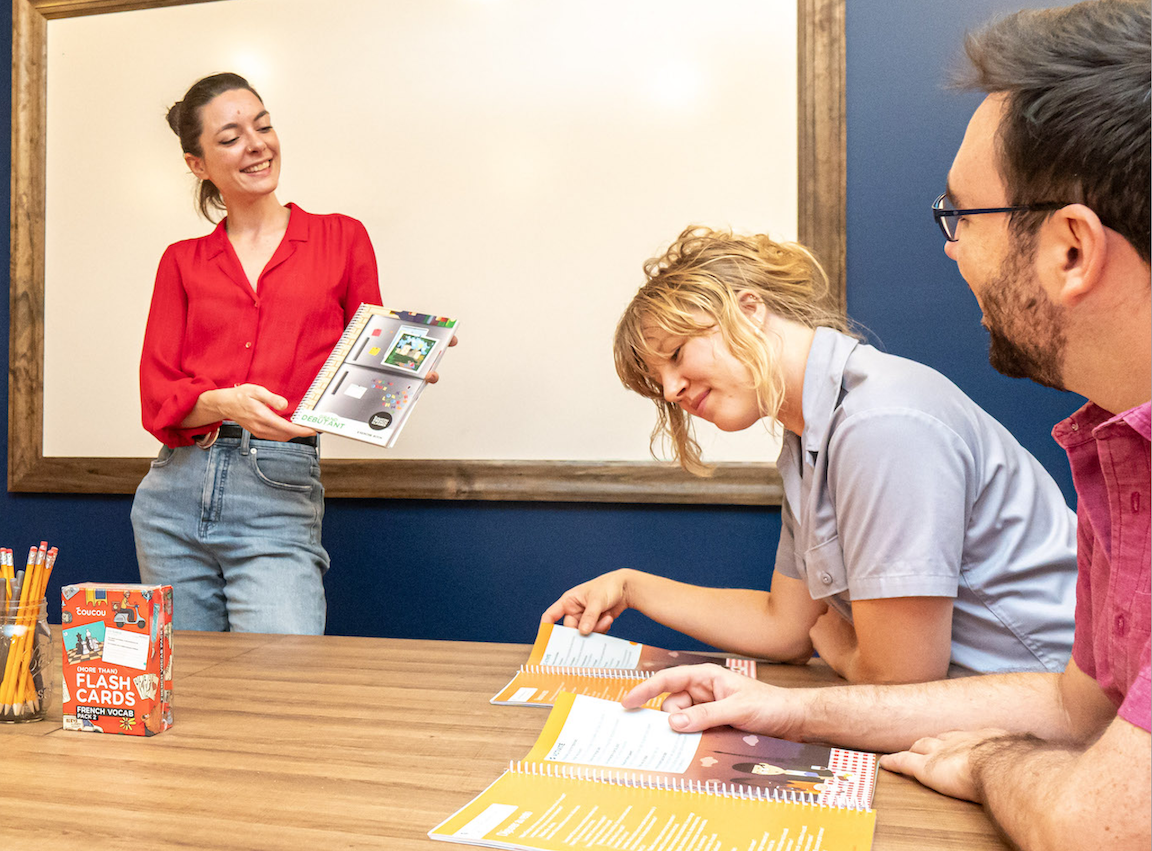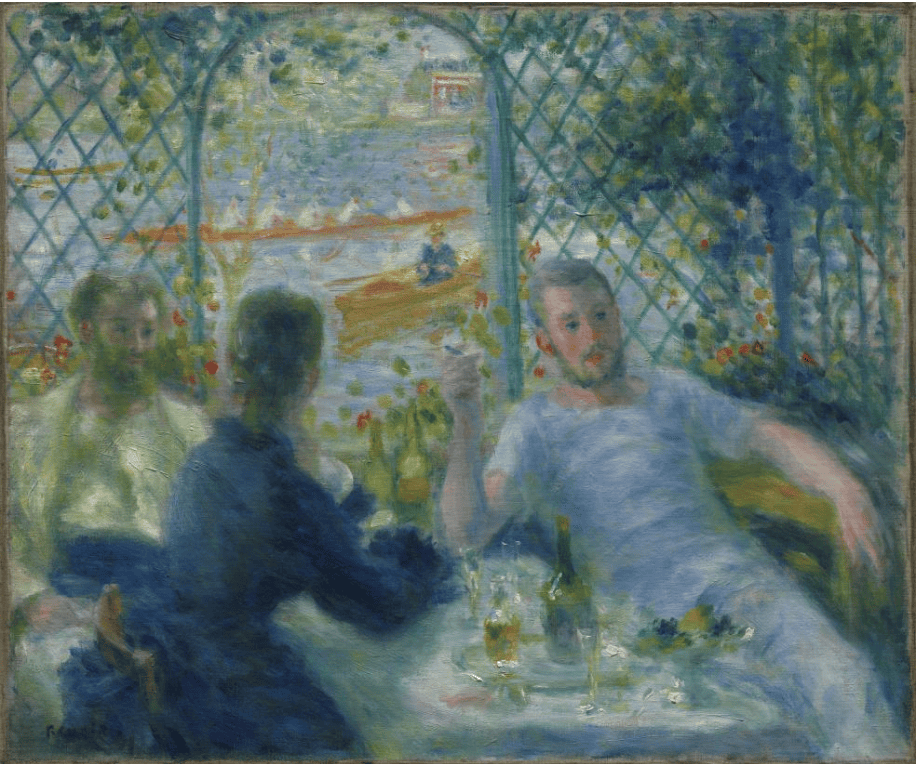Even if you’ve been studying French for years, you’ve probably noticed that there are some mistakes you just keep making. It’s really hard to switch your English brain off when you’re speaking French. For instance, you might know that actuellement and actually are false cognates, but still find yourself saying, “Actuellement, ugh, no, I mean en fait…” But don’t be hard on yourself! All of our students, even ones who have lived in France or who are practically bilingual, make little mistakes sometimes.
Since we first opened Coucou, we’ve been compiling a list of common errors we hear from speakers of all levels. Fix these mistakes, and we guarantee that your French will improve drastically!
“UNE PLACE” ≠ a place

When you want to refer to a location, use “un lieu” or “un endroit” rather than “une place.” This video breaks down the differences between these words.
In general, French speakers will use a specific word for a location, rather than saying “un lieu/endroit.”
Example: I went to Roberta’s on Friday night, I love that place! -> Je suis allé à Roberta’s vendredi soir, j’adore ce lieu ce restaurant !
The word “place” in French has multiple meanings. You can translate as follows:
-“room” or “space” –> Example: There is room/space for 4 people in the car. -> Il y a de la place pour 4 personnes dans la voiture.
-”plaza” or “square” –> Example: I walked across the square to go to the Tuileries. -> J’ai traversé la place pour aller aux jardins des Tuileries.
-“ticket” or “seat” –-> Example: I bought two tickets for The Magic Flute. -> J’ai acheté deux places pour La flûte enchantée.
“ENTENDRE QUE” ≠ to hear that / to hear about

This is an easy fix. Entendre can’t be followed simply by que. Instead, use “entendre dire que” ou “entendre parler de.”
-“hear that” –> Example: I heard that Coucou LA moved to a more spacious location. -> J’ai entendu dire que Coucou LA déménageait dans des locaux plus spacieux.
– “hear about” –> Example: I heard about Coucou’s Mardi gras party. -> J’ai entendu parler de la fête de Mardi gras de Coucou.
“JE MANQUE” / “JE PLAIS” ≠ I miss / I like

Both the verbs manquer and plaire are used a bit differently in French. Manquer + the preposition à means to miss a person, place, or thing. The person you miss is the subject of the verb. This is particularly confusing because in French you’re literally saying “X is missing to Y,” whereas in English you say “X misses Y.” This works similarly for plaire + à.
– Example: I miss my family. -> Ma famille me manque. (Incorrect: “Je manque ma famille.”)
– Example: I like this guy. -> Ce mec me plaît.
Note: Use the verb rater when you’re talking about being absent or when you miss the train/bus etc.
– Example: I missed class last week because I was sick. -> J’ai manqué raté le cours la semaine dernière parce que j’étais malade.
“BONNE SOIRÉE” vs. “BONNE NUIT”

In English, “Have a good night!” and “Have a nice evening!” are used interchangeably. In French, however, bonne nuit is used only at bedtime. You can think of “bonne nuit” as meaning “nighty night.” Unless someone’s heading off to bed, you should always say “bonne soirée.” Similarly, when you’re referring to anything that takes place in the evening, make sure you say le soir not la nuit.
– Example: I went to the movies with my boyfriend last night. -> Je suis allée au ciné avec mon copain hier soir.
– Example: “I need to run, I’m supposed to meet Charlotte at Maxime’s birthday party”, “All right, have a good night!”-> Je dois y aller, je dois retrouver Charlotte à l’anniversaire de Maxime. Ca marche, bonne soirée!
“J’AI EU UN BON TEMPS” ≠ I had a good time

In French, you don’t have a good time, you pass or spend a good moment, or day, or evening. As we saw in the “place” example, the French are more specific when it comes to times and locations. Although you can say, “J’ai passé un bon moment,” a French person is likely to replace moment with une bonne journée/soirée. The word “temps” is reserved for expressions like “avoir le/du temps” (to have time), “passer du temps” (to spend time), “le temps que” (while), “de temps en temps” (from time to time), or “combien de temps?” (how long?).
– Example: I had such a good time (today)! -> J’ai passé une très bonne journée!
Note: While many English time expressions can be translated literally with the word “temps,” there are a few expressions that call for a different word.
-“at the time” -> “à l’époque”
-“one time, two times, three times / this time, the first time, the last time” -> “une fois, deux fois, trois fois / cette fois-ci, la première fois, la dernière fois”
-“What time is it?” / “To be on time” -> “Quelle heure il est?” / “être à l’heure”
“JE SUIS TARD” / “JE SUIS TÔT” ≠ I’m late / I’m early

“Tard” is an adverb that can be used in a sentence like “J’arriverai plus tard” (I will arrive later). To say that you or anything is late, you must use the adjective retard. The same goes for tôt: you can say “J’arriverai plus tôt” (I will arrive earlier), but to say “I am early” you have to use the adjectival phrase en avance. Thus the correct sentences are: “Je suis en avance” or “je suis en retard.” Tôt and tard literally refer to the time of day (it’s early = c’est tôt), whereas en avance and en retard are always in relation to another event that is taking place (e.g. to be early/late for an appointment).
– Example: On the weekend, I get up late, but during the week I have to get up early to go to work. –> Le weekend je me lève tard, mais la semaine je dois me lever tôt pour aller au travail.
– Example: This morning I got up at 7, I was late because my alarm didn’t go off at 6:30. -> Ce matin, je me suis réveillé à 7h, j’étais en retard parce que mon réveil n’a pas sonné à 6h30.
– Example: Sorry, there are trains delays, I’m going to be late for class! -> Désolée, il y a des retards dans le métro, je serai en retard en cours!
– Example: When you fly, you need to be at the airport 2 hours early. -> Quand on prend l’avion, il faut arriver à l’aéroport 2 heures en avance.
J’AI VOULU vs. JE VOULAIS / J’AI PU vs. JE POUVAIS / J’AI DÛ vs. JE DEVAIS

Modal verbs are incredibly difficult for English speakers to master. Can, want, and must work very differently in French. Devoir, pouvoir, and vouloir all pose the same problem for French learners: it’s difficult to know whether to conjugate them using the imparfait or the passé composé. Use the imparfait if you’re describing something that was intended or an ongoing situation/feeling. Use the passé composé to talk about a completed action or result.
-Example: I couldn’t come to the party on Friday because I had to work late. -> J’ai pas pu venir à la soirée vendredi parce que je devais travailler tard. –> the use of passé composé implies that the person definitely didn’t go to the party.
-Example: I had to tell him the truth because he’s my best friend. -> J’ai dû lui dire la vérité parce que c’est mon meilleur ami. –> The use of passé composé implies that he did tell the truth.
-Example: We wanted to see Anatomy of a Fall at the movies Saturday evening, but there were lots of people and my boyfriend didn’t want to wait in line -> On voulait voir “Anatomie d’une chute” au cinéma samedi soir, mais il y avait beaucoup de monde et mon copain n’a pas voulu faire la queue. –> The use of passé composé implies that they didn’t go see the movie
TOUS ET PLUS

To pronounce the S or not pronounce the S? That is the question all French learners ask themselves. You do not pronounce the S at the end of tous when the word is an adjective. You do pronounce the S when tous is a pronoun (that is, when it replaces someone or something). Feeling unsure about tous or maybe tout.e.s? Watch this French video!
-Example: All (of my) friends live in Brooklyn. -> Tou(s) mes amis vivent à Brooklyn.
-Example: They all live in Brooklyn. -> Ils habitent touS à Brooklyn.
If you’re having a hard time wrapping your head around tous, rest assured that plus is easier to master! When you’re using plus as an adverb in a negative sense (we don’t X anymore/there’s no more X), you never pronounce the S. You also don’t pronounce it when it’s in front of an adjective or another adverb. Let’s look at a few examples.
-Examples: Julie doesn’t live in the US anymore. -> Julie ne vit plus aux Etats-Unis.
Marie is taller than Melissa -> Marie est plus grande (adj) que Melissa.
I speak more slowly when I teach French. -> Je parle plus lentement (adv) quand j’enseigne le français.
You do pronounce the S in certain positive situations (I have more X than…). That is, when plus acts as an adverb before a noun, or simply modifies a verb.
-Examples: I have more courage than Paul. -> J’ai plus de courage (noun) que Paul.
Marie has more pairs of pants than dresses. -> Marie a plus de pantalons (noun) que de robes.
I drink more since I’ve become depressed. -> Je bois plus (adverb that modifies the verb boire) depuis que je suis déprimé.
STRESSÉ vs. STRESSANT / FATIGUÉ vs. FATIGANT / INTÉRESSÉ vs. INTÉRESSANT

You can fix this mistake easily. Sometimes you’ll hear that French people say “I am not interesting” when they mean to say “I’m not interested.” It’s just a question of knowing that stressé means stressed and stressant means stressful. Intéressé = interested, intéressant = interesting, fatigué = tired, fatigant = tiring. If you want to get into the nitty gritty grammar, the rule is that adjectives that end in -É are for passive objects (=-ed in English), and those that end in -ANT are gerunds, and therefore used for active subjects (=-ing in English).
Example: I am stressed (by my job). -> Je suis stressé (par mon travail) / I am tired (because of my boss) -> Je suis fatigué (à cause de mon chef) / I’m interested (by this documentary) -> Je suis intéressé (par ce documentaire).
Example: My job is stressful. -> Mon travail est stressant. / My boss is tiring. -> Mon chef est fatigant. / This documentary is interesting. -> Ce documentaire est intéressant.
(SE) RETROUVER vs. (SE) RENCONTRER

Rencontrer means to meet someone for the first time, whereas retrouver means to meet up with someone (whom you already know). French speakers use se rencontrer or se retrouver reflexively if they want to talk about two or more people meeting each other.
-Example: I met my husband (for the first time) at work. -> J’ai rencontré mon mari au travail.
-Example: I met Pia at Lorimer Station. -> J’ai retrouvé Pia à la station Lorimer. / We met up on the platform. -> On s’est retrouvé sur le quai.





